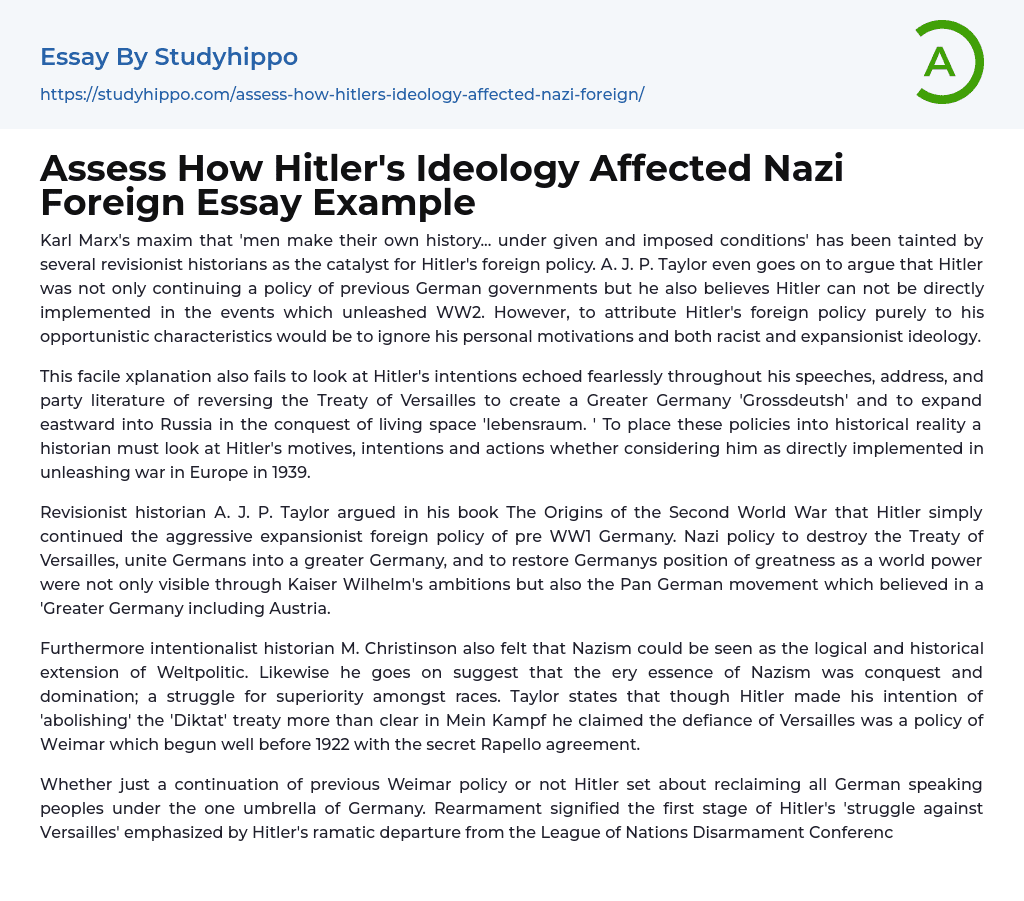

Assess How Hitler’s Ideology Affected Nazi Foreign Essay Example
Karl Marx's belief that 'men make their own history... under given and imposed conditions' has been challenged by some revisionist historians who suggest that it played a role in Hitler's foreign policy. A. J. P. Taylor takes this argument further by claiming that Hitler not only carried on the policies of previous German governments, but also argues against directly linking Hitler to the events that led to World War II. However, dismissing Hitler's opportunistic tendencies as the sole cause of his foreign policy would overlook his personal motivations and his racist and expansionist ideology.
Despite neglecting Hitler's stated intentions in his speeches, addresses, and party literature, it is crucial to take them into account. These intentions encompassed the reversal of the Treaty of Versailles to establish a larger Germany ('Grossdeutsch') and territorial expansion towards Russia for more li
...ving space ('Lebensraum'). To comprehensively grasp these policies within their historical setting, historians must scrutinize Hitler's motives, intentions, and actions, particularly when examining his direct involvement in initiating the European war in 1939.
Historian A. J. P. Taylor argues in his book The Origins of the Second World War that Hitler's actions can be viewed as an extension of Germany's aggressive expansionist policy prior to World War I. The Nazis sought to dismantle the Treaty of Versailles, unify all Germans into a single nation, and regain Germany's global influence. This desire for power was not only apparent in Kaiser Wilhelm's endeavors but also in the Pan German movement, which advocated for a 'Greater Germany' encompassing Austria.
Moreover, according to intentionalist historian M. Christinson, Nazism can be understood as a natural progression of Weltpolitic and can be
seen as the embodiment of conquest and domination, representing a fight for supremacy between races. Additionally, Taylor argues that Hitler explicitly expressed his desire to "abolish" the Treaty of Versailles in Mein Kampf and claimed that the Weimar government had been defying the treaty since before 1922 through the secret Rapello agreement.
Hitler's objective was to unite all German-speaking people under one Germany, whether it continued the previous Weimar policy or not. The process began with rearmament, which symbolized Hitler's opposition to the Treaty of Versailles. In October 1933, Hitler dramatically exited the League of Nations Disarmament Conference to emphasize this stance. By incorporating the inhabitants of the Saar region into Germany and implementing conscription after leaving the League of Nations, Shirer argued that Versailles' restrictions had been lifted. The remilitarization of the Rhineland in 1936 further disregarded both the Treaty of Versailles and Locarno Treaty. This was followed by Austria's Anschluss in March 1938. Through the Munich conference in 1938, Sudeten Germans from Czechoslovakia were incorporated into Germany; subsequently, German soldiers occupied Prague by March and absorbed the remainder of Czechoslovakia. These actions were influenced more by international circumstances and reactions from other European leaders rather than Hitler's pre-existing beliefs.
Disregarding Hitler's Mein Kampf as mere fantasies from prison, Taylor Van Der Vat assigns blame to the expansionist policies of the Nazi regime due to the policy of appeasement adopted by foreign powers. This policy not only revealed a lack of political will to enforce international treaties but also set a negative precedent, providing comfort to aggressors. C. Naylor further asserted that the policy of appeasement demonstrated that the Western powers were unwilling
to confront Hitler and instead were willing to make concessions.
Naylor argues that the breaking of the treaty by Great Britain in the Anglo-German Naval agreement inadvertently encouraged Hitler's expansionist aims. Taylor and other revisionists fail to acknowledge the significance of Nazi ideology and Hitler's role in causing World War II. Professor David Kaiser argues that these views are no longer regarded as valid. Kaiser argues that through Hitler's consistent words and actions, his racist and expansionist goals were evident before 1933.
N. Rich and G. Weinberg, along with other intentionalist historians, argue that the writings, speeches, and policies of leading Nazis in the 1930s consistently reflected their beliefs on "race and space." They claim that Hitler's book Mein Kampf clearly demonstrates his planned foreign policy driven by ideas of racial purity and territorial expansion. In Mein Kampf, Hitler explicitly stated that the objective of their foreign policy should be the acquisition of land and soil. Furthermore, Hitler's aggressive intentions were evidenced in the Hossbach Memorandum of 1937 where he outlined his plans to conquer Austria and Czechoslovakia with military officials. While some historians believe that Hitler always had ambitions for a "Greater Germany," as demonstrated through the invasion of Austria and the Sudetenland, J. Clare suggests that his subsequent invasion of Czechoslovakia indicated a desire for more than just German territory. Moreover, Hitler's belief in shifting Germany's focus towards eastern land is further emphasized by his invasions of Danzig and Poland in 1939.
- Adolf Hitler essays
- Concentration Camps essays
- Elie Wiesel essays
- Holocaust essays
- Nazi Party essays
- Weimar Republic essays
- Absolutism essays
- Appeal essays
- Bourgeoisie essays
- Contras essays
- Corporate Governance essays
- Corruption essays
- Democracy essays
- Democratic Party essays
- Developed Country essays
- Dictatorship essays
- Elections essays
- European Union essays
- Federalism essays
- Foreign essays
- Foreign policy essays
- Gentrification essays
- Hillary Clinton essays
- Income Tax essays
- International Relations essays
- John Marshall essays
- John Stuart Mill essays
- Left-Wing Politics essays
- Liberty essays
- Military essays
- Monarch essays
- Monarchy essays
- Political Corruption essays
- Political Party essays
- Political Science essays
- President Of The United States essays
- Public Service essays
- Red Cross essays
- Reform essays
- Republic essays
- Revenge essays
- Social Security essays
- Sovereign State essays
- State essays
- Supply essays
- Terrorism essays
- United Nations essays
- World Trade Organization essays
- Battle Of The Somme essays
- League Of Nations essays



